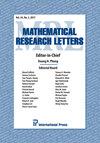Non-isogenous elliptic curves and hyperelliptic jacobians
IF 0.6
3区 数学
Q3 MATHEMATICS
引用次数: 2
Abstract
Let $K$ be a field of characteristic different from $2$, $\bar{K}$ its algebraic closure. Let $n \ge 3$ be an odd prime such that $2$ is a primitive root modulo $n$. Let $f(x)$ and $h(x)$ be degree $n$ polynomials with coefficients in $K$ and without repeated roots. Let us consider genus $(n-1)/2$ hyperelliptic curves $C_f: y^2=f(x)$ and $C_h: y^2=h(x)$, and their jacobians $J(C_f)$ and $J(C_h)$, which are $(n-1)/2$-dimensional abelian varieties defined over $K$. Suppose that one of the polynomials is irreducible and the other reducible. We prove that if $J(C_f)$ and $J(C_h)$ are isogenous over $\bar{K}$ then both jacobians are abelian varieties of CM type with multiplication by the field of $n$th roots of $1$. We also discuss the case when both polynomials are irreducible while their splitting fields are linearly disjoint. In particular, we prove that if $char(K)=0$, the Galois group of one of the polynomials is doubly transitive and the Galois group of the other is a cyclic group of order $n$, then $J(C_f)$ and $J(C_h)$ are not isogenous over $\bar{K}$.非等均椭圆曲线与超椭圆雅可比矩阵
设$K$是一个不同于$2$的特征域,$\bar{K}$是它的代数闭包。设$n\ge3$是奇素数,使得$2$是模$n$的基根。设$f(x)$和$h(x)美元是系数为$K$且没有重复根的次$n$多项式。让我们考虑亏格$(n-1)/2$超椭圆曲线$C_f:y^2=f(x)$和$C_h:y^2=h。假设其中一个多项式是不可约的,另一个是可约的。我们证明了如果$J(C_f)$和$J(C_h)$在$\bar{K}$上是同构的,那么两个jacobian都是CM型的阿贝尔变种,并且与$1$的$n$根的域相乘。我们还讨论了当两个多项式都是不可约的,而它们的分裂域是线性不相交的情况。特别地,我们证明了如果$char(K)=0$,其中一个多项式的Galois群是双传递的,而另一个多项式是$n$阶的循环群,那么$J(C_f)$和$J(C_h)$在$\bar{K}$上不是同构的。
本文章由计算机程序翻译,如有差异,请以英文原文为准。
求助全文
约1分钟内获得全文
求助全文
来源期刊
CiteScore
1.40
自引率
0.00%
发文量
9
审稿时长
6.0 months
期刊介绍:
Dedicated to publication of complete and important papers of original research in all areas of mathematics. Expository papers and research announcements of exceptional interest are also occasionally published. High standards are applied in evaluating submissions; the entire editorial board must approve the acceptance of any paper.

 求助内容:
求助内容: 应助结果提醒方式:
应助结果提醒方式:


